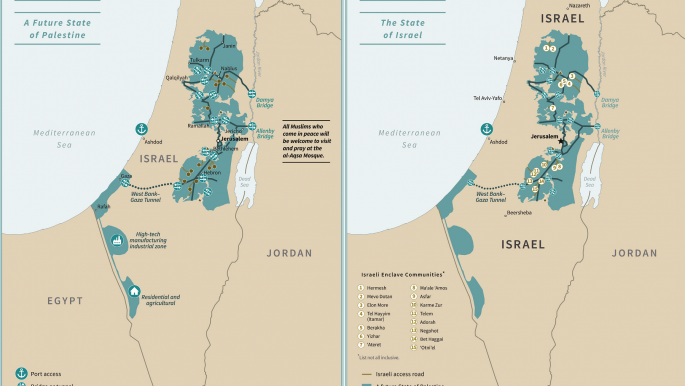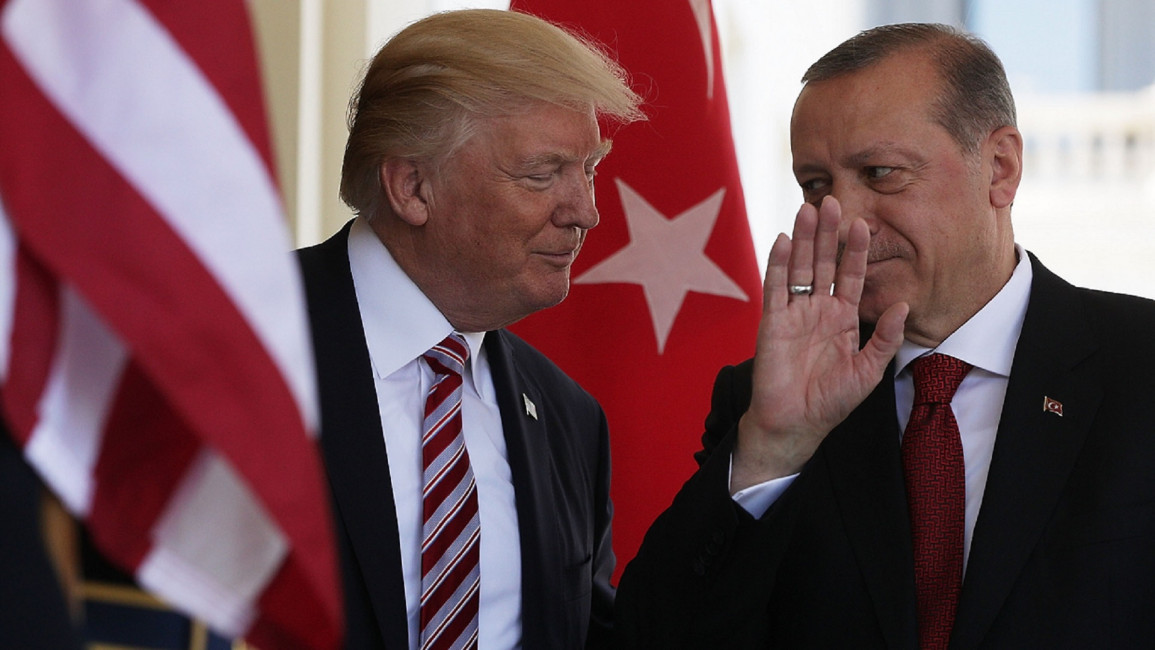Turkey rejects Trump's 'stillborn' Middle East plan, stands by Palestinians
"The United States' so-called peace plan is stillborn," Turkey's foreign ministry said in a statement.
"This is an annexation plan aimed at killing a two-state solution and extorting the Palestinian territory," it added.
"The Palestinian people and their land cannot be bought for money."
Trump on Tuesday unveiled long-awaited details of a US plan for solving the Israeli-Palestinian conflict, saying that Jerusalem would remain Israel's "undivided capital".
Turkey, a strong advocate of the Palestinian cause, said Jerusalem was Ankara's "redline".
"We will not allow any step that will legitimise Israel's occupation and persecution. We will always stand by brotherly Palestinian people. We will work for an independent Palestine in the Palestinian territory," the ministry said.
"We will not support any plan that is not accepted by Palestine. There will be no peace in the Middle East without an end to the occupation policies."
Read more: 'Deal of the Century': Palestinians feel letdown but can they resist American and Israeli dictation?
A large crowd of protesters gathered outside the US consulate in Istanbul, shortly after the announcement, in an event organised by the Turkish Islamic charity IHH.
"Down with Israel! Down with America!" they chanted.
Meanwhile, Palestinian leaders themselves rejected Trump's peace proposal as an unacceptable capitulation to Israel that tramples on the long-standing aspirations of their people.
Palestinian president Mahmoud Abbas vowed the initiative unveiled in Washington on Tuesday would fail.
"This conspiracy deal will not pass. Our people will take it to the dustbin of history," he said after a meeting in the West Bank city of Ramallah of various Palestinian factions including Islamist group Hamas, which pledged to "resist the deal in all its forms".
Trump's proposal included a long list of measures directly in line with Israeli interests, notably recognition of Jerusalem as the "undivided capital" of the Jewish state.
Twitter Post
|
"If Jerusalem is not the capital of the Palestinian state, how will we accept that?" Abbas asked, stressing that it was "impossible for any child, Arab, Muslim or Christian," to do so.
Senior Hamas official Khalil al-Hayya said the Islamist group which controls Gaza would never "accept any substitute for Jerusalem as the capital of the Palestinian state".
"We warn the whole world not to go along with this deal," he said.
Trump's plan triggered immediate condemnation on the streets of the Gaza Strip and the West Bank, with demonstrations expected to continue through the week.
Thirteen people were wounded in the West Bank after the Israeli army imposed a violent crackdown on protesters, the Red Crescent said.
One person was taken to hospital after being hit with a rubber bullet, while 12 others were suffering from exposure to tear gas, a spokeswoman said.
An AFP reporter said around 200 Palestinians confronted Israeli forces near Ramallah, burning photos of Trump and Israeli Prime Minister Benjamin Netanyahu.
Meanwhile, the European Union's top diplomat said on Tuesday that the bloc remains "firm and united" behind the quest for a negotiated two-state peace deal between Israel and the Palestinians.
High representative Josep Borrell was speaking after President Donald Trump unveiled a "last opportunity" for the Palestinians to sign up to a controversial plan drawn up by US officials.
"The European Union will study and assess the proposals put forward," Borrell said.
But he added: "This will be done on the basis of the EU's established position and its firm and united commitment to a negotiated and viable two-state solution that takes into account the legitimate aspirations of both the Palestinians and the Israelis, respecting all relevant UN resolutions and internationally agreed parameters."
Borrell acknowledged that: "Today's initiative by the United States provides an occasion to re-launch the urgently needed efforts towards a negotiated and viable solution to the Israeli-Palestinian conflict."

But he made it clear that European capitals see the need for more inclusive negotiation ahead.
"The EU reaffirms its readiness to work towards the resumption of meaningful negotiations to resolve all permanent status issues and to achieve a just and lasting peace," he said.
"It urges both sides to demonstrate, through policies and actions, a genuine commitment to the two-state solution as the only realistic way to end the conflict."
The statement did not say whether or not he had consulted some or all EU members before issuing his reaction, but most capitals have previously expressed support for a negotiated solution.
Pro-Israeli plan
US President Donald Trump’s so-called "Deal of the Century" Israel-Palestine peace plan has been exposed to be highly favourable to Israel, analysts said, just moments after the controversial document was revealed in Washington.
Conceptual maps included in the long-awaited peace plan, designed to resolve the Israel-Palestine conflict, expose Israel’s mass annexation of Palestinian land while giving the Palestinians limited sovereignty over an alleged “future Palestinian state”.
Meanwhile, Israel is due to remain in control of a unified Jerusalem as its capital, contrary to the demands of the Palestinians.
Trump’s plan also spares Israel’s controversial and illegal settlements in the occupied West Bank, which will remain in place. Around 200,000 Israeli Jews now live in east Jerusalem in settlement homes considered illegal under international law.
The Palestinians have already rejected the proposal, accusing Trump of being biased in favour of Israel as he has adopted policies that bolster Israel at their expense.
Trump, releasing the plan before a strongly pro-Israel audience at the White House with Israeli Prime Minister Benjamin Netanyahu by his side, acknowledged that he has done a lot for Israel, but he said he wanted the deal to be a “great deal for the Palestinians.” Trump said the deal is a "historic opportunity" for Palestinians to achieve an independent state of their own.
The 50-page political outline goes further in concessions to the Palestinians than many analysts had believed was likely. However, it would require them to accept conditions they have been previously unwilling to consider, such as accepting West Bank settlements. It builds on a 30-page economic plan for the West Bank and Gaza that was unveiled last June and which the Palestinians have also rejected,
Under the terms of the “peace vision" that Trump's son-in-law and senior adviser Jared Kushner has been working on for nearly three years, the future Palestinian state would consist of the West Bank and Gaza, connected by a combination of above-ground roads and tunnels.
Netanyahu and his main political challenger in March elections, Benny Gantz, had signed off on the plan.



